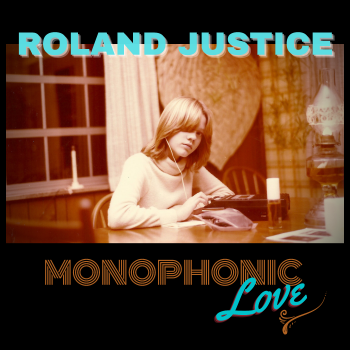
Nashville-area singer-songwriter/acoustic guitarists are plentiful, and Murfreesboro’s Cincinnati-area-transplant of “Nashville Cat”-ilk Roland Justice has added another straw to the camel’s back with his third full-length studio album, Monophonic Love, a solid production of 11 alternative-Americana originals that each get progressively better.
By the time listeners get to the eighth or ninth tracks, they may realize Murfreesboro’s John Salaway and other area songwriters have some friendly competition as area ears may embrace earworms like “Nine Hundred and Ninety-Nine.”
Monophonic Love, composed over a four-year period, seems to draw from the usual Americana influences: The Band’s Rick Danko and Levon Helm (“Ghost,” “First of April”); Bruce Springsteen (“Paradise Road”); and Jeff Tweedy/Wilco (“Homecoming”) to establish the album’s overall modern Murfreesboro Americana, dancing-in-the-kitchen sentiment.
Alternatively, Justice blends fat saxes and Billy Gibbons blues riffs in the roadhouse mash “Built for Speed.” Here, though, he gets a little carried away, screaming I feel like a motherless child, a tired cliche not unlike the current overuse of the term “cakewalk,” as time has “telephone gamed” the meaning of such phrases.
The album’s opener, “Come and Get Your Happiness,” plays with a dark, ethereal mood reminiscent of Neko Case. This can potentially bewilder listeners at the beginning, setting an expectation soon upended by the second track, the earthy and nostalgic “Homecoming.” After a full listen to the album, however, “Come Get Your Happiness” reveals itself as simply one of many influence nuances that keep the flow of Monophonic Love ceaselessly interesting.
The album’s autobiographical lyrics tap into roots-level themes: a young man’s pursuit of an ambition to become a songwriter in Nashville, devout love progressing to marriage through country sweet-nothings, and the Americana staple of a nostalgic familial homestead, states away, where a beloved father makes the best influence.
Monophonic Love’s tracks are seemingly ordered by an increase of lyrical integrity and sentimental value. You can hear the difference when you get to “Ghost,” co-written with fellow Cincinnatian Victor Shtrom. Then, the album just gets better, sweeter and more progressively thoughtful in familial sentiment through the remaining songs, solely written by Roland. Perhaps, Shtrom lit a fire under Justice.
The only thing separating Roland from what Nashville wants in its Cats is a heavy accolade, such as a Grammy.
Fans of well-crafted and diverse roots-based music will join me in thanking Justice for genuinely adding to Americana with such nuances as heard on Monophonic Love.
Find Roland Justice’s Monophonic Love at rolandjustice.com; hard copies of the album are available on CD and 12-inch vinyl.













